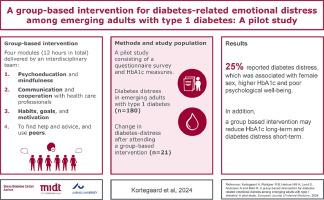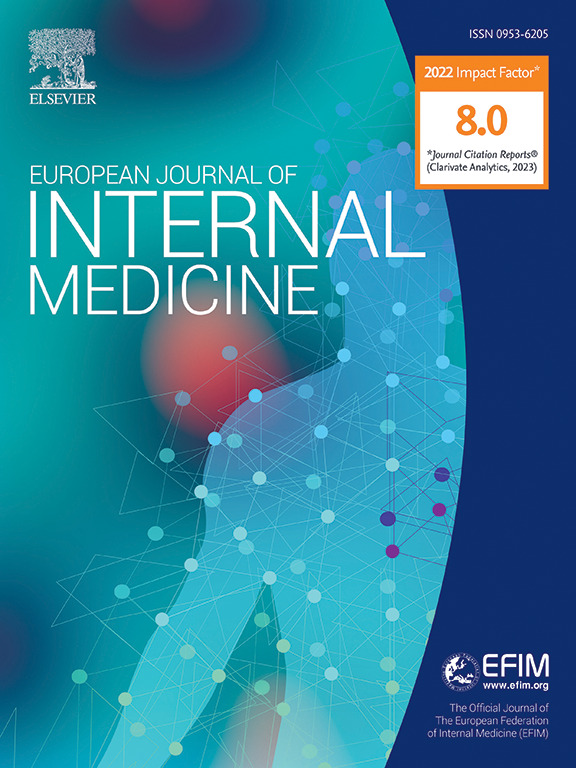针对 1 型糖尿病新成人患者与糖尿病相关的情绪困扰的小组干预:试点研究。
IF 5.9
2区 医学
Q1 MEDICINE, GENERAL & INTERNAL
引用次数: 0
摘要
目的:评估新发 1 型糖尿病(T1D)成人患者与糖尿病相关的情绪困扰(DD),并评估以小组为基础的干预措施的效果:方法:我们使用了由 20 个项目组成的糖尿病问题领域问卷(PAID-20)中的数据来调查 DD。此外,我们还分析了由五个项目组成的世界卫生组织幸福指数(WHO-5)和糖化血红蛋白(HbA1c)的变化。我们利用参与干预的新成人的随访数据对干预措施进行了评估:从 2021 年到 2023 年,我们使用 PAID-20 对 180 名新成人进行了筛查。DD(PAID-20≥30)的发病率为 25.0 %(95 % CI 18.9; 32.0 %),与女性性别、较高的 HbA1c 和 WHO-5 < 50 有关。基线时持续皮下注射胰岛素与 PAID-20 有关:这项试点研究表明,25% 的接受调查的新发 T1D 成人患者经历了与四个临床因素相关的 DD(PAID-20≥30)。我们发现,在采取以小组为基础的干预措施后,HbA1c 有所下降,PAID-20 也在短期内有所下降。本文章由计算机程序翻译,如有差异,请以英文原文为准。

A group-based intervention for diabetes-related emotional distress among emerging adults with type 1 diabetes: A pilot study
Aims
To assess diabetes-related emotional distress (DD) in emerging adults with type 1 diabetes (T1D) and assess a group-based intervention's impact.
Methods
To investigate DD we used data from the Problem Areas in Diabetes Questionnaire comprising 20 items (PAID-20). Furthermore, changes in the WHO Well-Being Index comprising five items (WHO-5) and glycated haemoglobin (HbA1c) were analysed. The intervention was evaluated using follow-up data from the emerging adults who participated.
Results
From 2021 to 2023, we screened 180 emerging adults using PAID-20. DD (PAID-20≥30) was prevalent in 25.0 % (95 % CI 18.9; 32.0 %), and associated with the female sex, higher HbA1c and WHO-5 < 50. Continuous subcutaneous insulin infusion at baseline was associated with PAID-20<30. 21 individuals attended a group-based intervention. At one-week follow up PAID-20 was reduced (29.1 ± 15.4 vs. 41.3 ± 12.1 at baseline, p = 0.003), and at nine-twelve months' follow-up HbA1c was reduced (59.3 ± 15.3 mmol/mol vs. 68.0 ± 17.4 mmol/mol at baseline, p = 0.012).
Conclusions
This pilot study demonstrated that 25 % of the investigated emerging adults with T1D experienced DD (PAID-20≥30) associated with four clinical factors. We found a reduction in HbA1c and a short-term reduction in PAID-20 following the group-based intervention.
求助全文
通过发布文献求助,成功后即可免费获取论文全文。
去求助
来源期刊
CiteScore
9.60
自引率
6.20%
发文量
364
审稿时长
20 days
期刊介绍:
The European Journal of Internal Medicine serves as the official journal of the European Federation of Internal Medicine and is the primary scientific reference for European academic and non-academic internists. It is dedicated to advancing science and practice in internal medicine across Europe. The journal publishes original articles, editorials, reviews, internal medicine flashcards, and other relevant information in the field. Both translational medicine and clinical studies are emphasized. EJIM aspires to be a leading platform for excellent clinical studies, with a focus on enhancing the quality of healthcare in European hospitals.

 求助内容:
求助内容: 应助结果提醒方式:
应助结果提醒方式:


